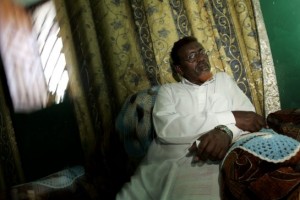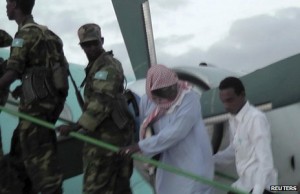National security reporter Michelle Shephard on her 2006 interview with Somalia’s foremost islamic militant, who is once again at the centre of a political storm
 The call for the interview came just minutes before we were to meet. “Sheikh Hassan Dahir Aweys will see you. Now,” an intermediary told us by phone.
The call for the interview came just minutes before we were to meet. “Sheikh Hassan Dahir Aweys will see you. Now,” an intermediary told us by phone.
We ran to our cars, guards in front, guards behind, and raced through Mogadishu’s sandy streets in the heat of an October afternoon.
Aweys’ home was somewhere off Ballad Rd., although all I can remember clearly is a little boy cradling a dusty blender and waving furiously at us as we turned onto his street.
“Ask me anything,” Aweys began our interview, although after an hour of talking through a Somali translator it was clear he would dodge as many questions as he would answer.
Aweys, who was added to the UN terrorist list in November 2001 for alleged links to Al Qaeda, is one of Somalia’s foremost militants. When we met in 2006, he was a leader of the Islamic Courts Union, which had briefly overthrown rivalling warlords to bring order to Somalia’s chaotic capital. The ICU had sanctioned the Toronto Star’s visit, which didn’t ensure our safety, but did allow us to get out of the airport with a $250 passport “visa” stamp.
Wrapping up the interview, Aweys stated: “We don’t have any links to Al Qaeda,” adding almost plaintively, “Why don’t they give us a chance?”
By “they,” he was referring to Washington critics who had dubbed the ICU “Africa’s Taliban.”
Fast forward through seven bloody years: a U.S.-backed Ethiopian invasion that quashed the ICU and helped give rise to Al Shabab; the Shabab’s formal merger with Al Qaeda in 2012; a succession of unpopular internationally backed governments; till today, where there is cautious optimism about Somalia’s recovery.
Once again, the aging but still powerful Aweys finds himself at the centre of the political storm.
 The 78-year-old was taken into custody by Mogadishu’s security forces last week — perhaps by surrender, perhaps through forceful persuasion — to an uncertain fate. He has reportedly defected from Al Shabab, which he had joined in 2010, after clashing with the Shabab’s hardline leader, Ahmed Abdi Godane.
The 78-year-old was taken into custody by Mogadishu’s security forces last week — perhaps by surrender, perhaps through forceful persuasion — to an uncertain fate. He has reportedly defected from Al Shabab, which he had joined in 2010, after clashing with the Shabab’s hardline leader, Ahmed Abdi Godane.
Aweys’ detention sparked both celebrations and protests in the capital — a reflection of Somalia’s complicated clan-influenced politics. Regarded by some as a war criminal, to others he remains an elder statesman of the Hawiye clan, which is dominant in Mogadishu.
His defection may be a political victory for President Hassan Sheikh Mohamoud, also Hawiye, but all eyes are on Mogadishu to see what happens next.
Source: The Star


